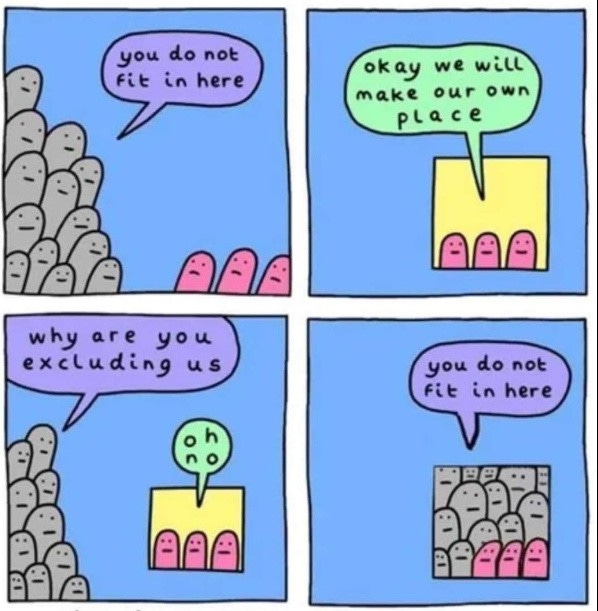So, the Equality Act has passed the House. And Glenn Greenwald has once again succeeded at pissing off half of Twitter (unironic kudos).
We have recently been presented with quite the conundrum: there are those who argue that there needs to be spaces limited specifically to members of the female sex. That sports, dating apps, etc. can only serve this group if they maintain that exclusivity. On the other hand, you have those who perceive this exclusivity as clear and unjust discrimination, and argue that excluding trans women is wrong and must be opposed.
So, it is time to look at yet another tension in modern political thought: how to reconcile competing views on autonomy/freedom.
First, a comic:

The tension emerges because on the one hand, exclusion limits autonomy. If some group is exclusive, there are those that cannot join. This is not fair, cries the excluded! And this unfairness is felt far more strongly when it relates to a characteristic the individual has no choice over (like race or sex) or a characteristic the individual holds very central to their identity (like sexuality). But on the other hand, eliminating exclusivity similarly limits autonomy of the groups that want to be exclusive/have their own place.
We have two competing claims regarding autonomy, which cannot be resolved by an appeal to autonomy/freedom, since the principle appears to support both sides. On the one side, autonomy is interpreted as "freedom of association", in which individuals and groups are allowed to include and exclude whoever they want, for whatever reason they want. On the other side, we have the diversity/inclusivity nexus, in which exclusion on the basis of immutable characteristics and/or strongly held values is wrong, since we did not choose those characteristics and should not be limited in our choices because of them. (And since many strongly held values aren't truly "chosen" either, this nexus is not contradictory)
It is also important to note that the deeply felt arguments about exclusivity seem to derive also from inequality: more specifically, from unequal distributions of opportunity and resources across different groups, places, etc. In that manner, exclusivity is seen not as a lifestyle choice, but a selfish attempt to maintain power at the expense of others. "Kicking out the ladder when you've climbed all the way up (or were born at the top)."
So we have a tension between the autonomy of different individuals and groups. How do we resolve this?
"My freedom ends where yours begins"? Nope. Nonsense.
Negative vs. Positive rights? Nope. Also nonsense.
The Harm Principle or one of its derivatives (like the NAP)? Not a chance.
Majority rules? Don't like that one bit.
So how do we resolve this? The economic/opportunity aspect can be resolved policy-wise with a concerted effort. But that still leaves the question of FoA vs. inclusion.
Truthfully, I believe this question comes down to whether or not it is a valid impulse for a person to desire a Home: a place with continuity of history and culture, where one is embedded and feels a sense of mutual belonging and acceptance. I perceive this impulse as a wholly valid one, and for that reason, endorse the FoA angle to a degree. Although as I've noted before, freedom of association cannot only apply to people with enough money to be free of retaliation from bosses, banks, etc. It must be primarily a concern of individuals, families, neighborhoods, and towns, not corporations (and especially not large ones). Preserving Homes means that neighborhoods and towns (aka communities) need to be able to maintain their character over time. To make sure every person has a Place where they can feel that belonging and acceptance we all need to live meaningful and fulfilling lives. Ultimately, a patchwork of Homes, each with their own character, can allow for both diversity and cohesion/belonging by allowing every person to find their own Home while making sure all people respect each other's Homes and need for belonging.



Why doesn't the harm principle apply? Women and girls need same-sex spaces because men commit the overwhelming majority of sexual assaults - literally overwhelming like between 97-99% (the sex binary is alive and well when it comes to violent crime). Trans rights undermine same-sex spaces by seeking to convert them into 'same-gender' spaces, which includes any male who claims to be a woman and in practice means any man.